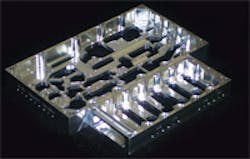Shop believes in automation
Edited by Charles Bates
Senior Editor
Michael Kurkulonis believes in the value of automation, and when it comes to purchasing manufacturing equipment, that belief is guiding an increasing number of his purchasing decisions. Automation allows his small shop Poplar Hill Machine Inc. in Conway, Mass., to achieve an extremely high level of productivity and has proved fundamentally necessary due to the shortage of skilled machinists in the area. It also improves the quality of his finished high-tech components for the telecommunications, aerospace and medical industries.
“My motto is ‘one op complete,’” said Kurkulonis, president of Poplar Hill Machine, when referring to his business philosophy and what contributes to his success. “The less we move the part, the greater our accuracies and proficiency.”
A collection of carefully selected machines from Hurco, Kitamura, Fanuc RoboDrill and Okuma sit on the shop floor at Poplar Hill Machine. And attesting to Kurkulonis’s belief in automation and dominating his shop floor is an Okuma MA-400 HA Space Center horizontal machining center, with an automated tool changer that houses 198 different tools, and an automated pallet exchanger with 12 pallets that allow round-the-clock operation, seven days a week.
Besides its range of automated functions, the Okuma’s accuracy and speed met the criteria for machining an extremely complex part presented to the shop in concept by a customer specializing in computer chip assembly. The part was so complex, that other engineers the customer approached were still puzzling over how to machine it when Kurkulonis came up with the solution.
The customer wanted the parts quickly and agreed to give the job to Poplar Hill Machine if it invested in the equipment to produce them. To seize an opportunity to expand into the manufacturing of hightech parts and components, Kurkulonis contacted The Robert E. Morris Company to inquire about what Okuma had to offer.
The Robert E. Morris Company engineers studied Kurkulonis’s machining requirements and created a schematic design that incorporated the Okuma MA 400 machining center with an upgraded heavy-duty spindle and a myriad of tools, technology, and accessories. Key components of the design were the extensive automated tool changer and state-of-art pallet changer with custom toolholding from Rego-Fix.
Poplar Hill Machine’s stand-alone system has 12 tombstone-style pallets that accommodate 96 workpiece surfaces and permit continuous machining of one job or multiple diverse jobs. A Chick Workholding system provides batch production capability for the system.
“For us to compete in any environment, we have to run ‘lights out,’” Kurkoulonis explained. “One of the reasons we went with the Okuma was because of the capability to run 12 pallets in consecutive order. Some of the parts we machine require 0.005-in.-diameter end mills and entail lengthy cycle times. With this system, we can program the jobs and let them run unmanned, all weekend long.”
A thermodynamically stable machining system was critical to Poplar Hill Machine’s lightsout operation. The types of applications that the shop planned to run, in conjunction with the need to maintain exacting tolerances, necessitated adding a sophisticated high-pressure coolant system to the Okuma, complete with a chiller system that maintains a constant coolant temperature.
Poplar Hill Machine holds tolerances to within 50 millionths of an inch of the customer’s specifications with the Okuma MA 400. Kurkulonis also added ABSO glass scales and laser calibration system from MD Calibration to measure and verify his levels of accuracies.
Most parts are presented to Kurkulonis while still in the concept stage. He has both Mastercam and EdgeCam software and will use either or both programs to execute prototype designs. His engineering background facilitates work with customers in the emerging field of microwave radio telecommunications, one of his leading areas of new business. The shop has become highly skilled at developing machining processes and prototypes on quick turnarounds – a necessity when working with that rapidly evolving industry.
The Okuma machine experiences little downtime going from machining prototypes to cranking out ongoing orders from Poplar Hill Machine’s current customer base of more than 20 accounts. While a prototype is being examined or a first article inspected by a customer, the machine is programmed to run any one of the 58 jobs already stored in its THINC OSP software.
Poplar Hill Machine runs difficult and diverse jobs using the Okuma machine, without sacrificing productivity. The shop’s machinists can program a feedrate of 600 ipm, and the machine will automatically decelerate and accelerate as needed around curves, looking ahead at least 50 lines in the program to ensure constant machining. With these capabilities, the machine easily handled a recent job where it circle-interpolated a 1.125-in.-diameter bore at 50 ipm in 6061 aluminum while maintaining a tolerance of +/- 0.0001 in.
